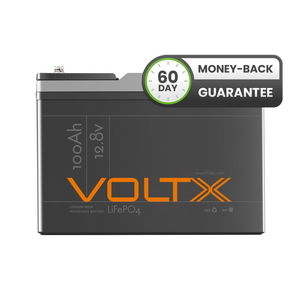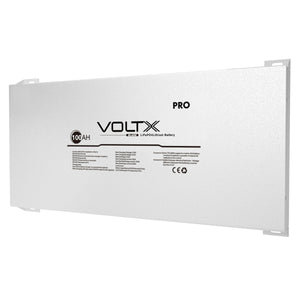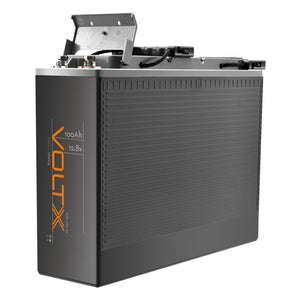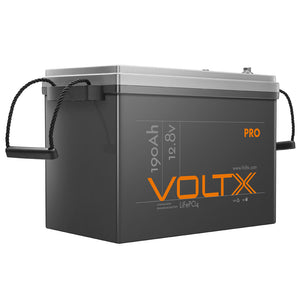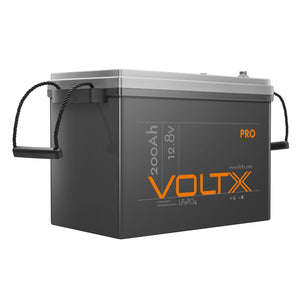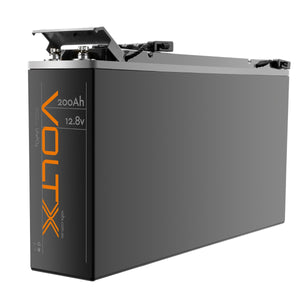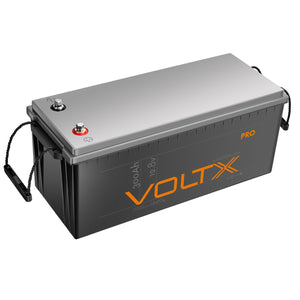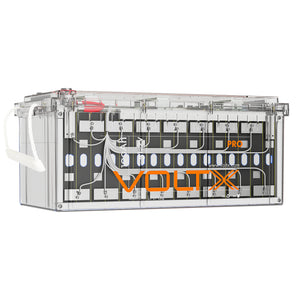VoltX 12V 300Ah Pro Lithium LiFePO4 Battery
Was$1,499.00Now $1,124.25Unit price /UnavailableVery low stock
Geelong is a famous spot for leisure activities. This Melbourne city is home to numerous beaches, campsites, and urban centres, making it a perfect place to achieve work/life balance. If you're a beach person who loves exploring the sea, you'd probably be itching to go boating here. However, don't just hop on that ride yet. You want to make sure you have good boat batteries with you. Yes, boats require special batteries which are also referred to as marine batteries. They are classified into three types: starter batteries, service batteries, and dual-purpose batteries.
As the name suggests, starter batteries mainly function to help kickstart your boat's engine. These batteries give off concentrated but shorter bursts of power that are only suitable for cranking up your ride, which is why you need a secondary battery for your appliances on board.
Your auxiliary battery should be reliable enough to run whatever additional equipment you have on your boat, be it a fridge, a microwave, or a fan. Ideally, the best battery for this job would be deep-cycle batteries. They have up to 80% of usable capacity, unlike conventional lead-acid batteries that can only be used up to 50%. For maximum performance with every use, go for lithium deep-cycle batteries, like LiFePO4 batteries. It’s a combo of long lifespan, enhanced safety, and extended runtime, perfect for keeping your essentials nicely powered up. The last type of marine battery is a dual-purpose battery. They perform both the function of starting the engine and powering electronics, great for those who are not keen on installing a 12V dual battery system although they’re not suitable for all types of boats.
If you’re looking for a good boat battery, Geelong has a lot of options for you. There’s Battery World Geelong and Marshall Batteries Geelong, plus Outbax too, if you prefer online shopping. We have tons of lithium batteries for sale here, including the famous VoltX slimline lithium battery. They’re all affordable too, without compromising on quality to cater to adventurers on a budget!
How Many Batteries Do You Need On Your Boat?
Normally, boats only need two batteries-the starter and deep-cycle battery. This can vary depending on the type of boat you have though. For instance, small boats under 14 feet which are usually used for quick boat rides only usually require only one battery. Mid-sized ones within 15 to 23 feet most likely need two and maybe even more if it has a trolling motor. Large boats with more than one engine should have extra batteries as well, with one for each engine and probably an additional deep-cycle marine battery too, depending on how much load you want to draw from it.
How Do You Install Boat Batteries?
Step 1: Select a good dual battery switch
A dual battery switch mainly isolates the engine battery from the house battery. When this is turned on, it automatically connects your starter battery to your engine and your deep-cycle battery or house battery to your loads for efficient runtime. Make sure it has enough power to handle your engine's starting amperage-around 250A of rating should be enough. You can even buy a switch with additional accessories like locks to prevent theft or field disconnect circuits for extra protection of your alternator.
Step 2: Installation of auxiliary battery
You can either ask help from a professional for this or do it yourself provided that you have enough knowledge and experience in battery installation. See to it that your secondary battery is equipped with ample capacity. Most outdoor enthusiasts go for 100Ah deep-cycle batteries, but you can also go for something higher like a 200Ah lithium battery if you have extra appliances on your boat. Also, if you really want to make sure you'll never run out of power, you can also add additional power sources to your boats such as a marine generator or solar panels.
Step 3: Set up your battery switch
Switches typically measure four to six inches, so allocate a space that is wide enough for you to be able to access it easily, preferably as close to the batteries as possible. Do not finalise installation yet and work on connecting the cables and posts at the back first.
Step 4: Connect the positive cables
Connect the positive cables of your primary and secondary battery to the corresponding posts at the back of the switch, then connect the positive cable from the engine to the output port of the switch. Note that these cables should have a "marine cable" stamped on the insulation and are usually around size 2/0.
Step 5: Connect the negative cables
You will need crossover cables to connect the negative terminals of both batteries. You also need to connect the negative cable from the engine and the negative accessory wire to either of the negative battery posts.
More from Outbax
Now that you know all about boat batteries, it's time to pick your own power pack. Here at Outbax, we do not specialise in lithium marine batteries alone. We also have camping battery packs and even solar batteries. Whether you're after batteries in Geelong, batteries in Darwin or batteries in Launceston, we make sure you get the best one delivered to you as fast as possible. Our focus is on affordable camping equipment and aside from batteries, we also offer different types of solar panels and inverter generators. Shop now and upgrade your adventure!
